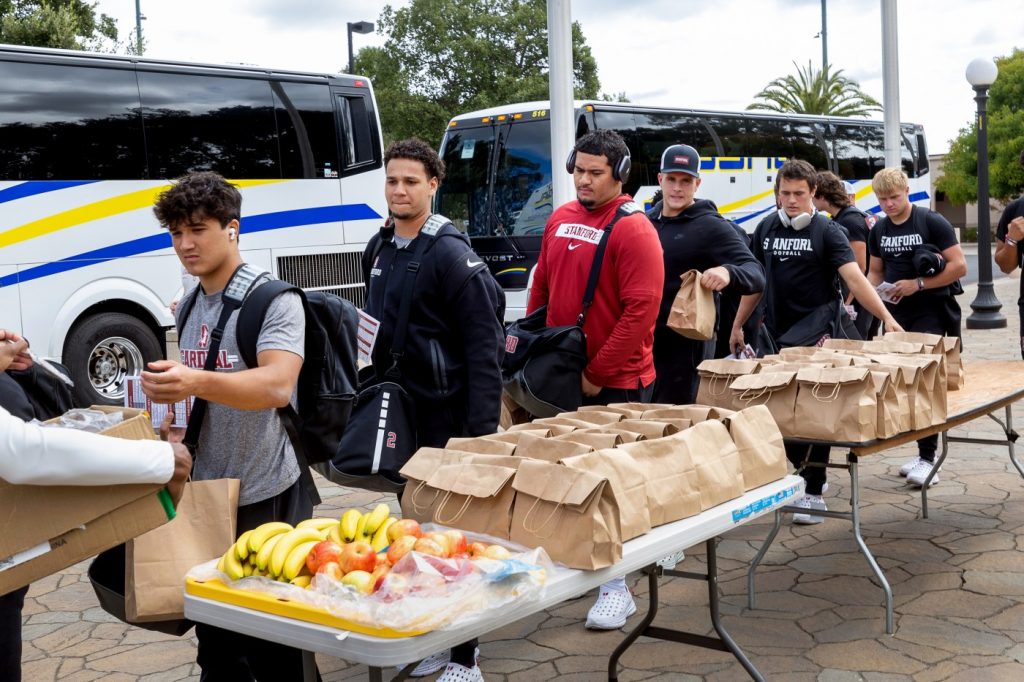Over the coming months, Cal and Stanford, the newest members of the Atlantic Coast Conference, will become familiar with a slew of new conference opponents. The list of names includes Duke and Miami, Louisville and North Carolina, Clemson and Notre Dame. Their most challenging opponent, though, won’t be one they meet on a field, court or pitch.
It will be the travel – and the litany of challenges that come with it.
“This year is going to be a learning year for all of us,” said Josh Hummel, Cal’s executive senior associate athletics director. “It’s trial and error for a bit. We’re going to go based on our assumptions, which are rooted in science and conversations and everything else. We’ll go, we’ll see how it works, then, if we need to, make changes.”
The schools’ transition to the ACC won’t affect the travel schedules of most of their sports. Of Stanford’s 36 teams, the school says 22 will either be minimally impacted or not impacted at all. For Cal’s 30 teams, that number is 18. But as for football, baseball, softball, basketball, soccer, volleyball and others? They’re set to become frequent fliers.
Cal Bears football player Ricky Correia and his teammates head to board their bus after practice at the Memorial Stadium in Berkeley, Calif., on Thursday, Sept. 19, 2024. The Bears traveled via bus to a flight to its first ACC game at Florida State. (Ray Chavez/Bay Area News Group)
Every team in the ACC aside from Cal, Stanford and fellow newcomer SMU resides in the Eastern Time Zone. Cal and Stanford’s flights to face the likes of Duke, North Carolina and Miami will routinely be five-plus hours, not including transportation and inevitable delays. Those long hours in the air stand to affect the bodies and minds of each program’s athletes.
“Traveling multiple time zones will make them less likely to perform athletically, but it also increases injury risk, too,” said Dr. Nirav Pandya, a pediatric orthopedic surgeon and sports medicine specialist at UCSF.
Before this week, only the men’s soccer teams had played an ACC road game. Women’s soccer opened the ACC schedule Thursday night. The football teams play their first conference road games this weekend — Cal at Florida State, Stanford at Syracuse — while women’s volleyball teams will play their first road games next week.
Cal and Stanford cannot eliminate the effects of travel, but both schools are attempting to minimize its impact. Cal has worked with sleep and nutrition experts to inform coaches and athletes of best practices while on the road – and on a plane. Both programs will also leave earlier than usual for competitions to account for shifting time zones.
“There’s some people that say go out the day before. We’re going to go out a day early and see how we like it,” said Stanford football head coach Troy Taylor.
The main goal of leaving earlier is to allow athletes to acclimate their sleep schedules to a new time zone. According to Doug Gardner, the founder of ThinkSport Consulting Services in Lafayette, sleep is “the greatest performance enhancer there is.”
“No matter how you try to circumvent it or facilitate it, it’s still going to have an impact no matter what,” Gardner said.
There’s also the matter of mental health, which Pandya said may see “more profound” impacts than the physical travel effects.
According to a 2023 NCAA study on student-athlete health and wellness, mental health problems for college athletes “generally have improved since 2020, but are still at relatively high levels.” More time on the road not only results in less time for studies, but also to enjoy a social life. Gardner and Pandya point out that reduced physical ability stemming from increased travel can, in turn, result in a poorer mental state – and vice versa.
“I’m not performing well, then I get in my head, and if that continues, that can develop into something where it becomes more of a mental health issue for somebody,” Gardner said.
Cal and Stanford won’t be able to completely mitigate these issues, but Gardner believes both schools have strong resources to help athletes.
Levi Rogers and his teammates board buses in PAC 12 Plaza as they leave Stanford, Calif., Wednesday, Sept. 18, 2024, for Syracuse, New York and their first ACC game. (Karl Mondon/Bay Area News Group)
According to Gardner, Cal is one of the few universities in the country that has dedicated performance psychologists in addition to clinical psychologists. In 2020, Cal opened the Cameron Institute for Student-Athlete Development, which currently has four mental performance coaches. Gardner also noted that Stanford has licensed sports psychologists on staff as well.
“They have one of the deepest performance psychology departments in the NCAA, period,” Gardner said.
Cal women’s volleyball coach Jen Malcom said her team has recovery tools such as Normatec compression boots, a Hyperice Venom massage wrap, compression pants, foam rollers, blue light glasses and two different water bottles (one with regular water, one with electrolytes).
“That is a long list of things,” Malcom laughed, “We’re trying to make sure that it’s pretty seamless for them even though we’re traveling cross country.”
Added Cal volleyball player Sophia Johnson: “We do a lot of journaling before and after practice on where we’re at. I feel like our coaches and the support staff at Cal has been super helpful in giving us all the resources we need to feel super prepared and confident heading into this first match.”
Navigating classes while traveling is another potential stressor. Cal’s student-athletes will meet their professors at the beginning of the semester and work through the logistics. Additionally, teams will travel with learning specialists, tutors and test proctors as necessary.
Stanford officials did not respond in time for publication, but athletic director Bernard Muir acknowledged last month that the school must strike a balance for athletes to complete their work.
“Part of the experience we promised them is to make sure that they have the best academic, enriching experience and to be able to have a great athletic experience,” Muir told this news organization. “And we think we can still offer both.”
Related Articles
Big Ten football: The Hotline re-ranked the teams based on early results (and made several major changes)
‘Are we for real?’ Unbeaten San Jose State looks to answer more questions at Washington State
Big 12 football: The Hotline re-ranked the teams based on early results (the chaos could be second to none)
Stanford’s backup QB plays key role in preparation for Syracuse
Week 4 picks ATS: Utah and ASU cover, USC wobbles and Cal falls
Despite his praise of Cal and Stanford’s mental-health resources, Gardner notes that “no matter what resources you have, student-athletes are going to have to go have the lived experience, and that right there is going to be a challenge for them.”
The economic impact of Cal and Stanford’s transition to the ACC cannot be overstated. It’s not just that traveling to the East Coast is more expensive either. According to this news organization’s Jon Wilner, both schools face nine-figure revenue disparities compared to their competition.
Cal Bears football players head to board their bus after practice at the Memorial Stadium in Berkeley, Calif., on Thursday, Sept. 19, 2024. The Bears traveled via bus to a flight to its first ACC game at Florida State. (Ray Chavez/Bay Area News Group)
Gardner and Pandya believe that the transition to the ACC will impact Cal and Stanford’s ability to recruit, adding that some current athletes will transfer after experiencing the inaugural year in the ACC.
Malcom and Cal men’s soccer coach Leonard Griffin pointed to other realities in college sports. Malcom noted that among the Power Four conferences, the SEC is the only league left with every school in one geographic area.
“I think that the lure of playing at the highest level and playing against the best competition that you can have in the country outweighs the travel,” Griffin said. “Right now, that’s in the ACC.”
Only time will tell whether the athletes agree.
Stanford’s football team leaves PAC 12 Plaza in Stanford, Calif., Wednesday, Sept. 18, 2024, with a CHP escort for their ride to the airport to catch a flight to Syracuse, New York and their first ACC game. (Karl Mondon/Bay Area News Group)


